Sinner-Alcaraz: How Giri Nathan Saw the Future
A conversation with 'Changeover' author Giri Nathan about the rivalry that defines modern men's tennis.
NEW YORK — The U.S. Open women’s semifinals, played under the roof as rain lashed down for the first time during this fortnight, were spectacular.
Jessica Pegula played one of the best matches of her life, only dropping four points on her serve in the entire third set, but it still wasn’t enough to stave off Aryna Sabalenka, whose reliability and steadiness has been one of the most striking revelations of the last few years.
Sabalenka, into her sixth consecutive final at the hard court majors, will face Amanda Anisimova, who outlasted and outhit Naomi Osaka in a topsy-turvy three-setter which settled into a great groove after a shaky start.
It’s going to be a fascinating final. Anisimova, as many tennis fans know, has had frequent success against Sabalenka, winning six of their nine meetings. If she wins the U.S. Open final, in fact, Anisimova will have beaten Sabalenka at all four majors, despite having been significantly ranked below her during each of their meetings.
But in this dispatch, I want to look ahead to the fast approaching business end of the men’s U.S. Open, a tournament which has felt in many ways like a certain march to yet another certain Jannik Sinner-Carlos Alcaraz final.
If Alcaraz can beat Novak Djokovic and Sinner can beat Felix Auger-Aliassime, the two will meet in the final for a third consecutive major.
This is exciting stability for tennis fans, and it’s also remarkable validation of the foresight of author Giri Nathan, whose book about the Sinner-Alcaraz rivalry, Changeover, came out just before this U.S. Open began.
Giri and I spoke before on Bounces ahead of the French Open final, as you may recall, but this chat covers a lot of new ground.
This conversation was much more about the book itself, Giri’s process of writing it, and also the two biggest supporting characters in the book: Djokovic, who has the best chance to thwart another Sinner-Alcaraz final, and also Daniil Medvedev. This post also includes an excerpt from Changeover’s chapter on Medvedev, which is one of my favorite parts of the book.
Giri and I spoke for more than an hour, so our conversation is going to be divided up into two meaty halves here on Bounces. Enjoy!
Inspiration
Ben Rothenberg, Bounces: I don't know if people could tell—or if they cared— on our previous chats, but we weren't really discussing the book Changeover itself directly too much because of your publisher's wishes—which is fine. We had other reasons to chat about Sinner and Alcaraz: they kept doing new and big things, making French Open finals, Wimbledon finals this year.
We're recording this—well, real talk—we're recording it during the Sinner-Musetti quarterfinal, assuming that he's going to win this match, because he won the first four games in about six minutes.
Giri Nathan, Changeover: It feels like a pretty comfortable assumption.
Ben Rothenberg, Bounces: We're thinking he's going to win. But I want to talk more about the book itself, because I read an early version of the book and really liked it. I think it's a breath of fresh air into tennis writing, as you often are. But seeing it in book form, and having this sort of as a more like canonical work of tennis writing—it'll be on the shelves of people's homes and in stores for a long time. I'm just very glad it exists in the world, so thank you for making this book.
Giri Nathan, Changeover: Yeah, of course, and thank you for your interest in it and your help with it.
It was honestly a big time crunch, because I wanted to get it out in a timely way, but it was also just a lot of fun. Most of the time I was working on it, I was really having a good time, so I hope that comes through in the book, too.
Ben Rothenberg, Bounces:Let's talk a little process and inspiration here, a little bit of writer-writer chat here.
Giri Nathan, Changeover: For sure, yeah, I can get a little more specific than I have in the past.
Ben Rothenberg, Bounces: So you were here at this tournament only three years ago; it feels like longer ago, but it was only three years ago. On this kind of a quarterfinal night. Sinner and Alcaraz played each other in that U.S. Open quarterfinal in 2022. It's a five-setter; Alcaraz saves a match point of Sinner's, goes on to win the U.S. Open. That match was unreal.
What did you see in that match—and I know you talk about this in the book, and in every interview, you do probably—but I'm curious for that answer, and then also how did that turn into, ‘Wait, there could be a book here about these two young guys’? As someone who also wrote a book about a young player, I know there can be hesitation about that.
Giri Nathan, Changeover: For sure. The first piece of backdrop I'll give—and because this is a tennis audience, I'm sure everyone can get it: I want to just admit the tedium of the Big Three era.
I was feeling that acutely at some point, and I also felt like a chump because every time I got excited about a new player and started writing—I mean, I spent a week trying to profile Stefanos Tsitsipas in 2019. And every time I went through this cycle of excitement, they would just end back in the same place: getting their ass handed to them by these three guys. That cycle played out a couple of times.
And then this match, this 2022 quarterfinal you mentioned, felt like the first sincere glimpse of the future, of what was coming next. And actually, I left the grounds early that night; one of the worst decisions I've made as a tennis watcher. And I feel like this book is partially penance for missing that, because I was just up on my sofa 'til 3 a.m., just losing my mind.
Ben Rothenberg, Bounces: Wow, if you go to confession and the priest assigns you to write one book to make up for a sin, that's a hefty price for forgiveness there.
Giri Nathan, Changeover: (Laughs) Yeah, so that is the truth. I was watching the early rallies on the train home and I knew I'd made a horrible mistake. But yeah, I hopefully made up for it with this book.
But what I was seeing in that match was what they continue to display today: just this absurd, sliding athleticism and shot-making and incredible offense from defensive positions. And I feel like all of the also-rans of that slightly older generation—your Medvedev, your Tsitsipas, your Zverev—I feel like while they could win matches and win big titles, they all seemed limited. There are certain patterns on court they preferred; you'll see it most acutely with Medvedev and Zverev, for sure. And then with Stef, he's got his one-hander [backhand] as a very visible weakness.
With these guys, it was not at all obvious to me that there was any anything like that that you could attack. You don't have a Zverev out standing 12 feet behind the baseline; you don't have Meddy struggling to handle a mid-court ball. They just seem so comfortable in so many different regions of the court. And the absurd pace and spin that they were pulling off on all these shots—I was not seeing this tennis happen between any other pair of players, that's the simplest way to put it.
Ben Rothenberg, Bounces: I think that one of the things that struck me early in the Sinner-Alcaraz matchups—I guess the first time I would have seen them play, that I remember certainly, is the 2022 Wimbledon fourth round, the Grand Slam event one before that U.S. Open.
These were two young guys, so obviously their matchups get hyped: 'Oh, two young guns going against each other, NextGen battle. That was a fairly decisive win for Sinner in the end, but it was pretty clear, especially at that U.S. Open, that one of the great things about their rivalry—which not all rivalries have—is that I feel like them playing at their best makes each other better.
Giri Nathan, Changeover: For sure, 100 percent.
Ben Rothenberg, Bounces: They're kind of speaking the same language. They're not playing past each other; they're playing with each other, and engaging each other in this way that really makes them both better.
To me, my favorite of the Big Three permutations is definitely Federer-Djokovic, because I feel both of them can kind of do their thing. Rafa is such a unique and disruptive player—
Giri Nathan, Changeover: It kind of overtakes the game.
Ben Rothenberg, Bounces: It's like he talks over someone in an argument, especially with Federer, kind of shouts over with that topspin. It's this instrument that's just hard to keep up with, and you have to get on his level. Whereas Federer and Djokovic could both play their own peak versions of tennis and it would line up against each other.
Giri Nathan, Changeover: It's in conversation.
Ben Rothenberg, Bounces: In conversation, exactly, and they can be themselves and be effective against each other. And I think Sinner and Alcaraz had that from the jump, and still have that to this day.
Giri Nathan, Changeover: It's a very charismatic matchup.
Ben Rothenberg, Bounces: Yeah, and clearly they have chemistry, on-court chemistry. These two chemical compounds mix, these two ingredients make something together; it's not even like romantic chemistry.
Giri Nathan, Changeover: Don't tell the stans (laughs).
Ben Rothenberg, Bounces: Well, yeah, I'm sure whatever yaoi is going on with the two of them—I don't know if you have any favorite Sincaraz yaoi you want to share, I'm sure you've seen the depths of all of it. We do not have to get into that. (laughs)
But yeah, these two work together. There are certain rivalries that just work, and this one does. And that's really cool to see, and it feels like we're in good hands. Whereas some of the other rivalries feel like somebody trying to keep up with someone else in different ways.
Giri Nathan, Changeover: Totally, definitely, yeah. I think from the jump, I think that Paris match that they played in 2021, it was a good indicator of what was coming, too.
And then just the fact that Carlos played his first ever Challenger match against Jannik is so cosmically weird and incredible. Carlos was 15 and Jannik was 17.
Ben Rothenberg, Bounces: Yeah, things happened in their story so they feel cosmically linked in a certain way at this point, and they've kept up with that.
Process
Ben Rothenberg, Bounces: OK, so you watch this match in 2022, and you decide to write the book in 2023 at some point?
Giri Nathan, Changeover: Yeah, I mean we all saw Carlos break out and win that same U.S. Open.
So then it was a matter of like, I think Jannik has the game to keep up with him. But for him, I feel like the big step forward was his stamina and conditioning. Because if you remember at that time, he was a top-20 and eventually top-10 player, but he had really bad head-to-heads with the other elite players. And especially at the Slams, he was losing some tough five-set matches. So I think him getting his body prepared to handle the pressures of Grand Slam tennis was the thing I was kind of waiting on. And then he just started making that leap at the end of 2023, and that's when the gears started turning.
I was like: maybe this is the time to act, and that's when I started putting the proposal together. And then January [2024] is when I actually ran it by this publisher, and then by March I had signed the contract to do it.
Ben Rothenberg, Bounces: That's pretty quick, so you kind of hit the ground running.
Giri Nathan, Changeover: Yeah, because it was due basically a year from the day I signed the contract, so March 2025.
Ben Rothenberg, Bounces: OK yeah, I had a similar situation with Naomi—and Naomi got complicated because she got pregnant and that changed the timetable for our book. But yeah, but it's not a lot of time.
But what your guys did—which Naomi did not do (laughs)—is they cooperated with the results. Sinner was still a bit fledgling as a prospect, but he won the 2024 Australian Open and put himself clearly on the inside track; he was clearly going to be No. 1 in 2024, even if it took a few months for him to get there.
Giri Nathan, Changeover: For sure.
Ben Rothenberg, Bounces: And then Alcaraz wins the French and Wimbledon, and then Sinner wins the U.S. Open.
Giri Nathan, Changeover: And then in between, you have the gold medal match between Alcaraz and Djokovic, which is also serving one of the thematic goals of the book, too, because it's about the generational shift, and Djokovic is the last gatekeeper. That match was kind of a great time capsule for that.
Ben Rothenberg, Bounces: As he will be again in the semifinals against Alcaraz at this tournament.
Structure
Ben Rothenberg, Bounces: Alright, so you are on the road, and do you already have in mind—and this is just a writer question, maybe: did you already know it was going to be like "a year on tour with these guys" kind of book? What were your thoughts on structure, or did that come later?
Giri Nathan, Changeover: It was not at all obvious to me that it would follow the chronology of a season. I had to see the season play out in such a narratively neat fashion that it felt dumb to try to escape that construct. Another nice thing about the chronology is that you kind of move around the tour with it and you get to write a little bit about time and place—which I like doing a lot.
Ben Rothenberg, Bounces: Some of my favorite tennis books are year-on-tour books. Venus Envy by Jon Wertheim I love; Hard Courts by John Feinstein. Even Vince Spadea's book was a year-on-tour book.
Giri Nathan, Changeover: It's a very nice rhythm for a book, but I think it wasn't until November of 2024 that I actually sat down and really started working with the material and trying to figure out what structure it should take; chronological really seemed like the way to go.
And, yeah, in terms of how I was approaching it, I wanted to go to as much of the tennis as I could. And, for me, I had never toured as much as you, so even hitting whatever I did last year—eight or nine events—was grueling. So I don't know how you were doing that for so long.
Ben Rothenberg, Bounces: I don't know how I did it for so long, either. But it is a lot. And it's also just a different rhythm being so focused on a subject; I had this with Naomi.
I had covered the tour for The New York Times for roughly about 10 years, including the pandemic which disrupted that in terms of not traveling much. But then in 2022, I was basing my schedule around Naomi's schedule. For example, I remember very clearly when she had her one really good tournament in 2022 in Miami, she made the final—and the rest of the year was really bad, or mediocre at best. By her standards, it was just bad.
And I had resolved during that Miami tournament—because I'd been at Indian Wells for a long time and she had lost early—I was like, OK, I'm just going to go home whenever she loses. And then she made it to the finals! I had to rebook a new place to stay in Miami, a popular destination in March, every two days, and get a new car rental, doing these things over and over and again.
And I was getting a sense of what it's like to be in a player entourage or a player's team, where your fate is decided by one player's wins and losses. So it was an interesting method-way to write that book in some ways, seeing how precarious your fate is when it all rides on one player. Because previously, for The New York Times, I’d almost always go for the first round until the finals, and it's not results dependent,
But being results-dependent on her was different and a challenge, and also because her results and her whole career were so muddled in 2022. It was tough to get my thoughts organized mid-year.
But you had a lot of results to work with, and clearly had something that was taking off. I hope the answer is no, but was there any sort of double-edgedness to how obvious this idea became as it went along, or was it just great? Even now, as they've played in the last two major finals as this book is coming out, that feels awesome, but I don't know—is this book, like, less hipster than you thought it was going to be when you were writing it?
Giri Nathan, Changeover: No, no (laughs). When they started splitting the Slams, I was like that meme of Scrooge McDuck jumping into the coal mine.
This is the material that I really wanted to work with. I wasn't trying to put someone onto some sleeper storyline; I like doing that in my writing, but this was very much a case where I felt like these are going to be very mainstream characters to follow, and here's, a primer for people who will be coming to these guys—maybe for the first time when they see them play that inevitable major file someday. So in terms of that, they really delivered; I could not have asked for a better performance from them.
And what I really wanted to do was just witness it in real time, because I think a lot of sports books are written after the fact, and there's just a different tone to it. We've talked about this: it's a little more reverent, maybe, it's more serious. But actually, when you're doing it in real time, for me the most valuable resource I had for my reporting was just the notebooks I was keeping during the tournaments with tiny little observations. Even just seeing their camps walking around: what's the vibe? I love watching practices; it feels like a playdate between players that their coaches set up. You can kind of see how they're feeling outside of the matches.
So all that contemporaneous observation goes into the writing and hopefully makes it feel kind of present tense and fresh—that's really what I was going for.
Ben Rothenberg, Bounces: It definitely is present tense and fresh and not, like, omniscient. It's lived with them in a really cool way as you're seeing them and their years unfold, even if most people who read this book will know they won these Grand Slams.
Access
Ben Rothenberg, Bounces: Let's, in general, talk about like access as a part of journalism. You've written for Deadspin and then Defector; Deadspin especially in it's good old days was about ‘without access.’
Giri Nathan, Changeover: For sure, that was the credo, yeah.
Ben Rothenberg, Bounces: This book was not predicated on access, but I'm curious what access was like, and how did being at a bit of a distance influence your writing in this book?
Giri Nathan, Changeover: Yeah, it came in waves. First I deliver this proposal where it's very clear the book's, success is not predicated on access, hopefully my point of view is interesting to read.
And then, as part of my research, I was reading these classic sports books from the 70s, 80s, 90s and I'm like, 'Wow, these people can be a fly on the wall in these outrageous scenarios.' It's so far beyond anything doable in 2025 that I'm envious of it, but also it's so far out of the scope that I can't even grasp it. So part of it was slightly mournful for that era.
But then I was like ‘Honestly, there are cool things we have now’: the never-ending surveillance state of smartphones and fandoms. There are interesting little snapshots we get of these players, which I incorporate like pretty generously throughout the book. There are, actually, pretty great things about being able to catalog and organize videos from over the course of a tennis season effortlessly. We have some advantages, too.
Ben Rothenberg, Bounces: Even just that you had match footage. Whatever library you were using on TennisTV or Tennis Channel, whatever video on demand you would have had, that was not a given for people who were writing these books in the past. Back in the day lots of tennis matches were not televised, even into this century.
Giri Nathan, Changeover: Levels of the Game was like hitting different when you couldn't just pull up the highlight reel (laughs).
So that's why I became more optimistic. And then as I'm traveling on tour, even though it's in these press conferences and these little observed third-person observation scenes I have, I feel like I am enjoying developing a more rounded human portrait. I've learned all the tics that these guys have in conversation.
Ben Rothenberg, Bounces: ‘Let's see what's coming.’ [A Sinner catchphrase]
Giri Nathan, Changeover: Yeah, ‘let's see what's coming,’ ‘prepare in the best possible way.’ Carlos has ‘I'm not going to lie.’ Like, I basically spoke in this creole of Jannik-Carlos with my wife for months as I was writing.
And I compiled all their transcripts; I'm sure you did something like this for Naomi. And if I ever wanted to learn about a topic, I could just Ctrl+F in there. I highly recommend that.
Ben Rothenberg, Bounces: Oh yeah. I copy-pasted every single Nami Osaka transcript. Bless the people at the Wimbledon Press Room: I sent them an email with an attachment: ‘Can you print this document?’ It was like 400 pages. I went through and read all of them and I could do Ctrl+F for like, 'sister' for every time she would talk about her sister, that kind of thing.
Giri Nathan, Changeover: Yeah, exactly. So there are upsides to this era.
And I ended up catching other players in a few just fun, random, weird moments. Tiafoe is in here. For sure, getting other players to reflect on the two principals was some of the most fun material I got. You know, you can only get so much from the horse's mouth when he's speaking in his third language, and he's 20-22. It's also hard to reflect on your own status when you're still becoming the superstar in real time, so I totally get it.
It really helped when you're talking to the old heads and having them reflect on players younger than them. One of my favorite conversations was just talking to Gael Monfils, one of the real speed demons in the recent tour history. ‘Carlos is really fast, is he the fastest you've ever seen?’ And he went on a nice little monologue about the fastest opponents he'd ever had.
And I mean those players, they're not really threatened by the idea of talking about this new guard coming in; I think they find it kind of cute and just fun to talk about.
Ben Rothenberg, Bounces: And I think the ones like Monfils would understand that this is the passage of time. He's seen the seasons come and go in this sport.
Giri Nathan, Changeover: Yeah, yeah, yeah. That's what's so beautiful about the late career Monfils: he just seems like totally at peace with where everything is.
Ben Rothenberg, Bounces: He's so chill and so zen about his career, while still being good, and still having moments of being a credible top player when he chooses to be, or can be. I think it's pretty remarkable.
Giri Nathan, Changeover: In general I would say the players were very accommodating, and some people like Fritz or Medvedev would get super granular about what was cool about their games, and that was a great thing to be able to document.
Medvedev
Ben Rothenberg, Bounces: So let's talk about Medvedev, actually, because he's one of the players you write about. He crashed out of this tournament in pretty spectacular fashion this year in the first round, melting down against Bonzi.
Giri Nathan, Changeover: Second straight loss against Bonzi in the first round of a Slam.
Ben Rothenberg, Bounces: He hates that. He got rid of his coach and his long time trainer.
Giri Nathan, Changeover: It's kind of heartbreaking to me, yeah.
Ben Rothenberg, Bounces: It's also not 100 percent clear if they quit, or what order that happened in here. But it's not surprising.
I know from talking to you about writing the book, that Medvedev is one of your favorite people to write about. There's a Medvedev standalone chapter which I really enjoy in the book. And we'll have an excerpt of it here…
An excerpt from Changeover:
There is an image of Daniil Medvedev that I return to like a sacrament. It’s a screenshot of a slow-motion replay from the 2021 Australian Open semifinal. The camera is positioned along the baseline. Daniil is running toward us, having just struck a miraculous backhand winner. He looks not so much triumphant as crumpled. Bent over, back rounded into a turtle shell. Legs buckling, knees nearly knocking together. Feet pigeon-toed and pointed at angles that elicit a sympathetic wince. Thin arms drawn forward like long beans. It looks like what you’d get if you’d asked a child to draw a tennis player from memory—in the dark. It is not an image that inspires great confidence. That’s why I love it. No layman would ever conclude that it depicted one of the most hand-foot-eye-coordinated people on the planet.
Look at a similarly timed freeze-frame of Rafael Nadal and you see a form that might have been sculpted in antiquity. Look at the one of Medvedev and you see a software engineer encouraged by his wife to pick up a hobby. Whereas Nadal’s rigorous and explosive style can be intuited from his build, Medvedev’s uncanny and innovative style must be seen to be understood. And even then, it rewards watching and rewatching, where it reveals new wrinkles and anomalies. I have always been drawn to athletes who defy visual bias. Who cares whether their body types match the textbook illustration? What matters, in this arena, is what you can do to a tennis ball. Watching Medvedev marooned 10 feet behind the baseline, maneuvering his jangly limbs all over the court, swatting his flat, skidding shots, over and over, it is hard to grasp how these parts sum up to a world-class tennis player. Medvedev himself is as bamboozled as we are, saying, “When I see myself in videos, I’m like, ‘What am I doing?’”
It’s not just his tennis that resists easy comprehension. His personality, too, has left casual fans convinced that he is some enemy of the game. Perhaps they are reading too much into the expansive plain of his forehead, those cunning beady eyes, the physiognomy of a supervillain plotting to take down the power grid. What could have left those fans with this unsavory impression? What evidence could they find for it? Perhaps they’d caught the match from his 2019 U.S. Open run, when he’d subtly flipped the bird to the crowd, as though he were scratching the side of his head but happened to use only one finger. Or the end of that match, when he...spread his arms wide and waggled his fingers, as if he were a plant photosynthesizing their hatred.
Medvedev to me feels like the clear No. 3 character in this book in a lot of ways. Why was he such a fun touchstone for you?
Giri Nathan, Changeover: Yeah, for one, just maybe my favorite talker on the men's tour. Very granular, very good comic timing, very intelligent. He kind of works with the questioner and takes the best possible version of the question and plays with that.
And I just love that contrast between his disposition on the court of just being this absurd toddler and being a very thoughtful and even warm interlocutor most of the time. I feel like most reporters perk up when he enters the press conference, which I would not say about most players. So I just loved him as this observer of tennis.
And then the fact that he was caught between these two great generations of players, I think makes him a fun, tragicomic figure, almost. And having him observe these Big Three go and these new two guys come and surpass him, I just thought he was a fun vantage point to talk about the generational shift.
Comparing Generations
Ben Rothenberg, Bounces: This could be a whole think piece for another hour, but is there a clear throughline about 90s-born people—and men especially, because women haven't been quite as stark on this—but what made them just ill-suited for tennis greatness?
Giri Nathan, Changeover: I mean, it's a theme that I gesture at but don't hit right on the head, but I think there's something to the fact that you grew up in total reverence of these players; Tiafoe in the book, he calls it a "Mount Rushmore" effect, where when you line up across them, you've kind of lost two sets already. You're in your head about it.
And I don't think it's the full story of why these 2000s boys are succeeding, but I think there is something to the fact that maybe you did not deify the Big Three in quite the same way.
Ben Rothenberg, Bounces: Neither of them ever played Federer.
Giri Nathan, Changeover: Yeah, neither of them played Federer. It just wasn't quite the same.
And Musetti, who I spoke to while reporting the book also, he referred to the Djokovic "aura"; he said it in an amazing Italian accent which I can't even replicate. But he talked about this acute feeling: he's been up two sets on Djokovic in Paris, and he knows what it's like to have that inevitability storm back and just ruin your day. So, these guys don't have the scar tissue, I think that's part of it.
But I also think they are, also, athletically and technically, superior to the 90s boys. I think probably outweighs the psychological factor, but they both play a role.
The last point I would add to that is the reality of time's passage. They get to play the 36, 37, 38-year-old Novak and not the 27, 28, 29-year old one. So all these things play a role.
Ben Rothenberg, Bounces: OK, because you kind of invited that: what do you think of the classic barroom debates of how would this current Sinner or Alcaraz match up against peak Big Three?
Giri Nathan, Changeover: Yeah, I mean, my eyes kind of popped out of my head when McEnroe said these guys would routine Nadal at the French Open? Really, that's not where my head is at at all, but it very much seems like the level they have right now could hold a candle to peak Big Three. I don't see why not. In the same way that those guys revolutionized aspects of their game, it feels like Sinner and Alcaraz are doing the same with their relative frame.
Ben Rothenberg, Bounces: I think Nadal on clay is his own beast, but every other permutation, I feel like it could be competitive.
Giri Nathan, Changeover: Yeah, I think it would be quite competitive. And yeah, they're still getting started, so who knows where they'll go from here.
The Modern Djokovic
Ben Rothenberg, Bounces: Speaking of the Big Three, the one of them who's still around in this tournament is Novak Djokovic.
Djokovic is going to play Alcaraz in the semifinal we alluded to earlier. He's made all four slam semifinals this year, which is remarkable for a 38-year-old.
Giri Nathan, Changeover: It's unbelievable—and basically playing no other events in between.
Ben Rothenberg, Bounces: I hope he's getting appreciated enough. Serena, most obviously, maybe, made four Slam finals after her maternity leave—and didn't win any of them and lost them all pretty badly, actually—but still, making four Slam finals!
Giri Nathan, Changeover: Unbelievable.
Ben Rothenberg, Bounces: In her late 30s, coming back from having a baby, was crazy, crazy work. So hopefully, in retrospect she got her flowers for that.
But hopefully Djokovic is getting his in the moment. I don't think Djokovic is going to win this tournament without other people taking care of both Sinner and Alcaraz. Maybe he could beat one of them; he did beat Alcaraz in Australia this year.
But Djokovic playing a healthy, fit, ready Sinner—anywhere—I just don't see it for him. I think Sinner is too high a mountain for him.
Giri Nathan, Changeover: Yeah, I feel like that matchup is solved; it feels like there's not much more he can do there.
Ben Rothenberg, Bounces: What do you make—it doesn't have to be about the book, necessarily—but of current late-stage Djokovic?
What do you make of his presence, his continuation of doing this, what he's getting out of it, what he wants out of it, his potential? I already kind of declared him futile against Sinner, which maybe you don't agree with.
Giri Nathan, Changeover: I don't think I would disagree that strenuously with that.
He's maybe the third or fourth—depending on how you're counting—main figure in this book. I thought it would be really fun to portray him as the last member of this guard, keeping the kids at bay—which he does masterfully, and it seems like he's done that with real relish in his career. There's a quote I have in the book where he talks about how he enjoys going down two sets against the young guys because he trusts in his legs and he just knows he's going to win out.
A friend of mine once said, ‘Trying to beat Djokovic is like trying to fist fight the ocean.’
Ben Rothenberg, Bounces: That's great.
Giri Nathan, Changeover: So I think about that. And when the books about the great sports legends come out, I think they often sand away all the weird eccentricities and maybe the moments of pique or gracelessness, dare I say, at the end of a career—which are super interesting to write about, honestly.
So I kind of wanted to get into: what is it actually like to watch late-period Novak struggle against these guys?
Ben Rothenberg, Bounces: The way that all the edges get smoothed over, I think that's probably increasingly happening with a lot of the autobiographical nature of a lot of the content. Like the Serena in the Arena documentary from ESPN: that was what Serena wants to show.
They didn't show, even, her last two Slam finals; they were just left on the cutting room floor of that show, which is crazy.
Giri Nathan, Changeover: Narratively indefensible.
Ben Rothenberg, Bounces: It's completely indefensible, but they did do it.
Giri Nathan, Changeover: Yeah, I wanted to capture that phase of Novak's career. It was fun to capture a late period of a player's career not in the style of an elegy, let's say. I like having fun with it, showing the goofy parts of it.
Ben Rothenberg, Bounces: I’ve joked that I wrote a book about Naomi Osaka that's 450 pages long, and she was 25 years old when I finished the book. If I wrote a Novak Djokovic book in that style, it would be literally...
Giri Nathan, Changeover: 3,000?
Ben Rothenberg, Bounces: 2,000, 3,000. It'd be very much like a Robert Caro sort of book exercise.
Giri Nathan, Changeover: He's one of the greatest characters in sports.
Ben Rothenberg, Bounces: Seriously though, there's so much to Novak Djokovic.
Giri Nathan, Changeover: Yeah, there's so much lore around him, the fandom around him.
Ben Rothenberg, Bounces: So much weirdness, so many other characters in his life—and I'm sure I only know the tip of the iceberg.
Giri Nathan, Changeover: I could only capture a fraction of that here, and I wanted to keep it kind of localized to the 2024 stuff, which was plenty fascinating in its own way. But yeah, I wanted it to be like an accurate witness of what an early career looks like, and then also what a late career looks, because those are very contrasting emotional frames.
The second half of my conversation with Giri Nathan will be out ahead of the U.S. Open men’s final. Thanks for reading Bounces and please do go get yourself a copy of Changeover!



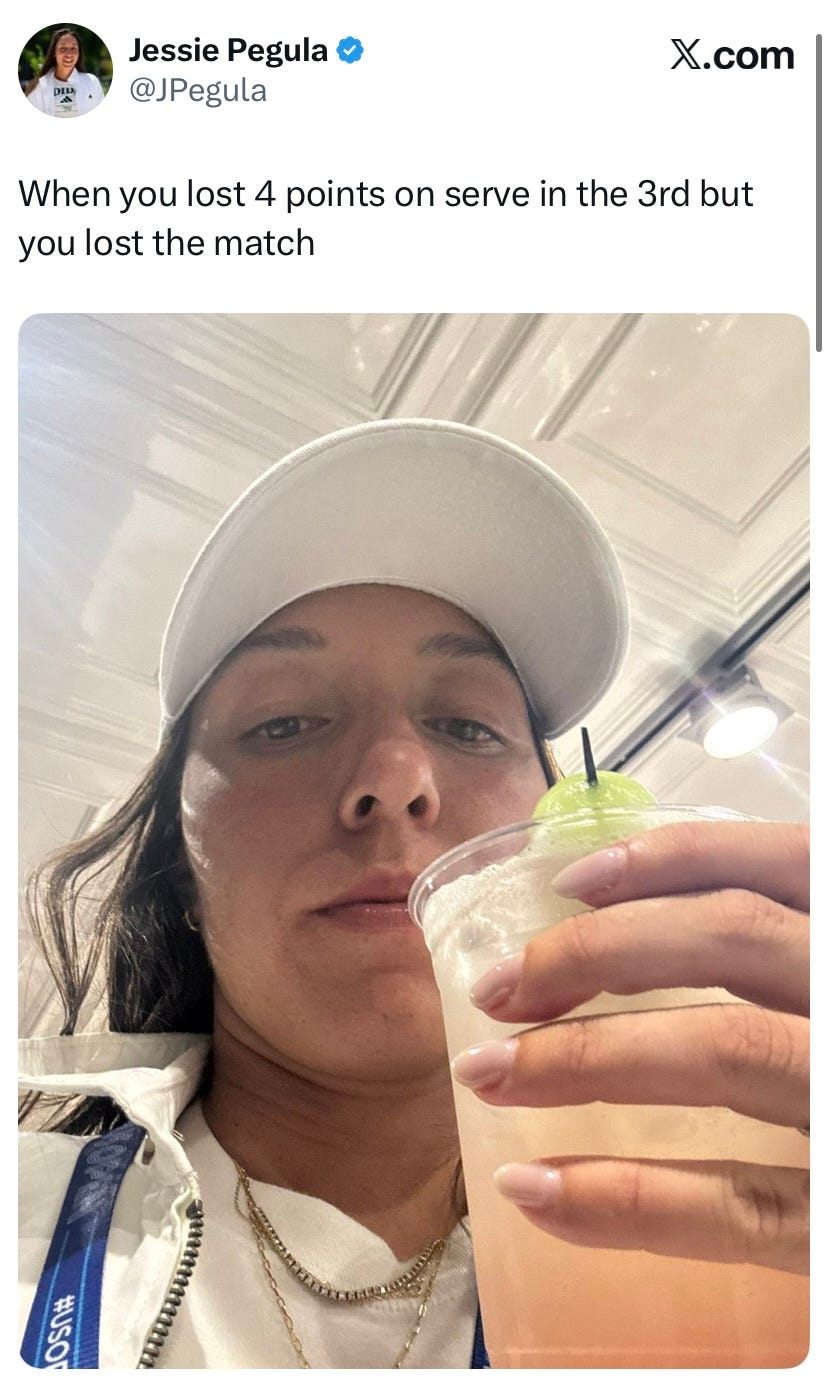
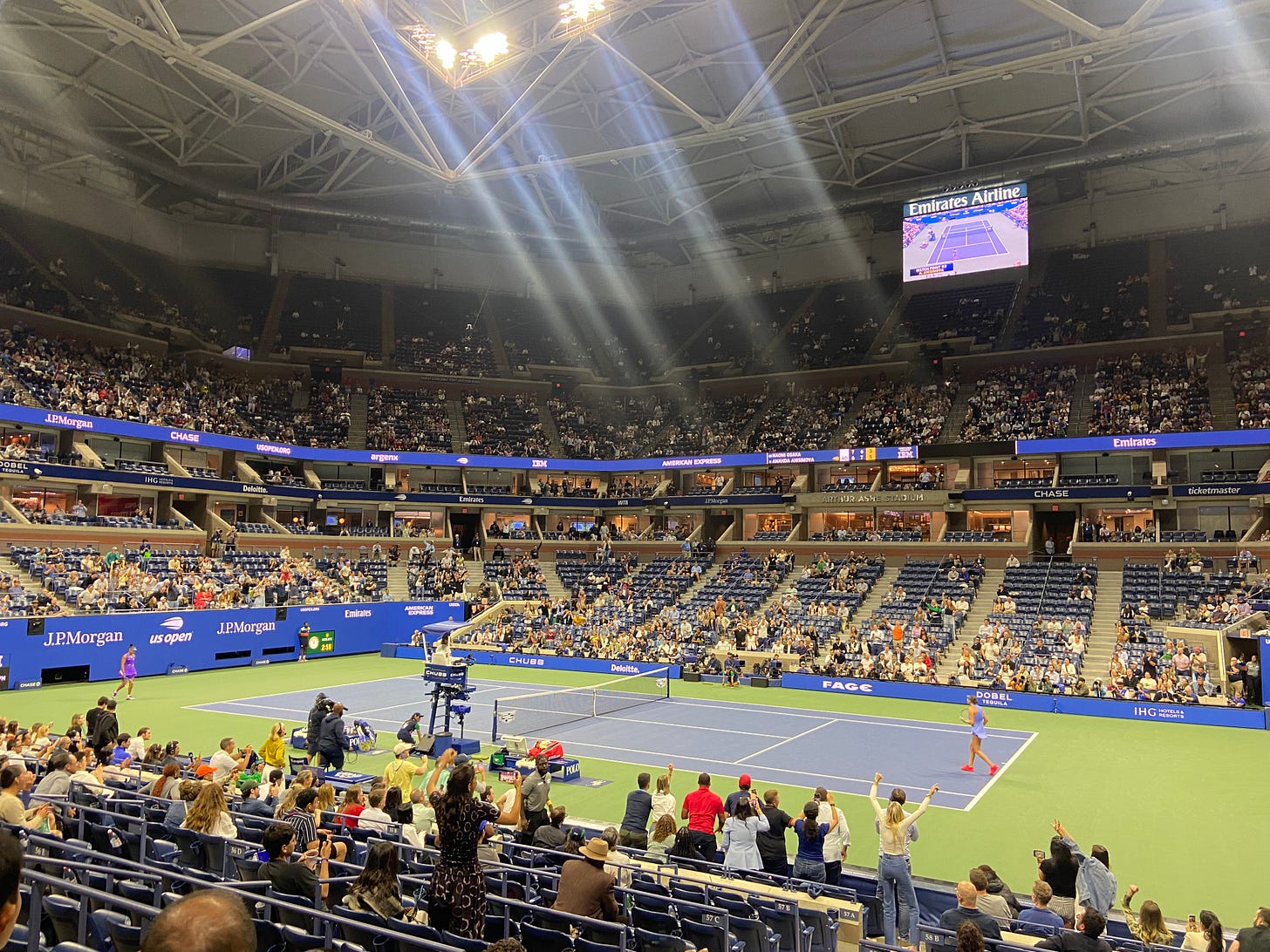
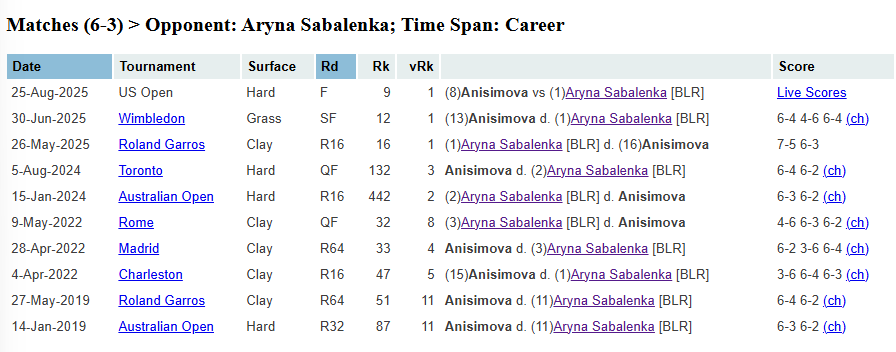
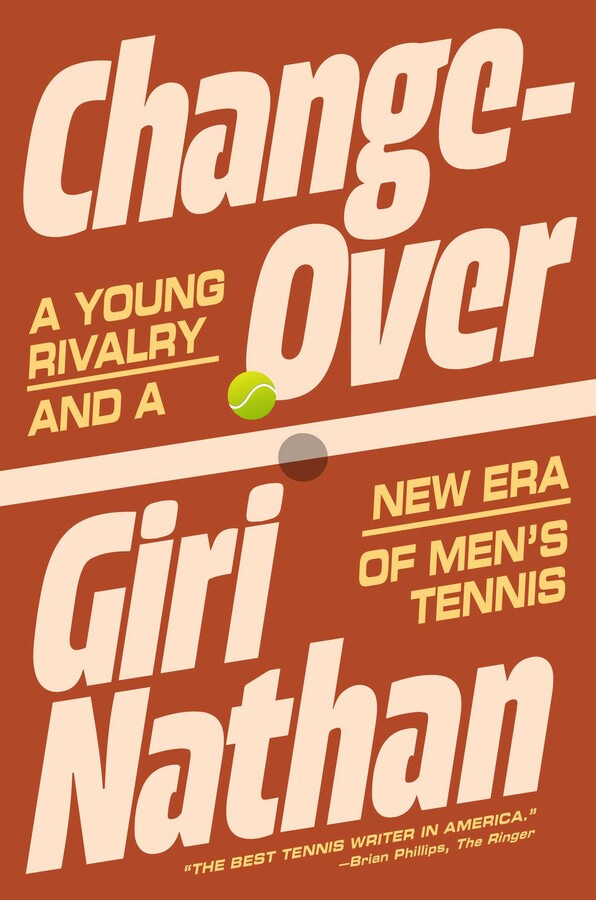
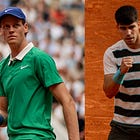
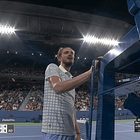
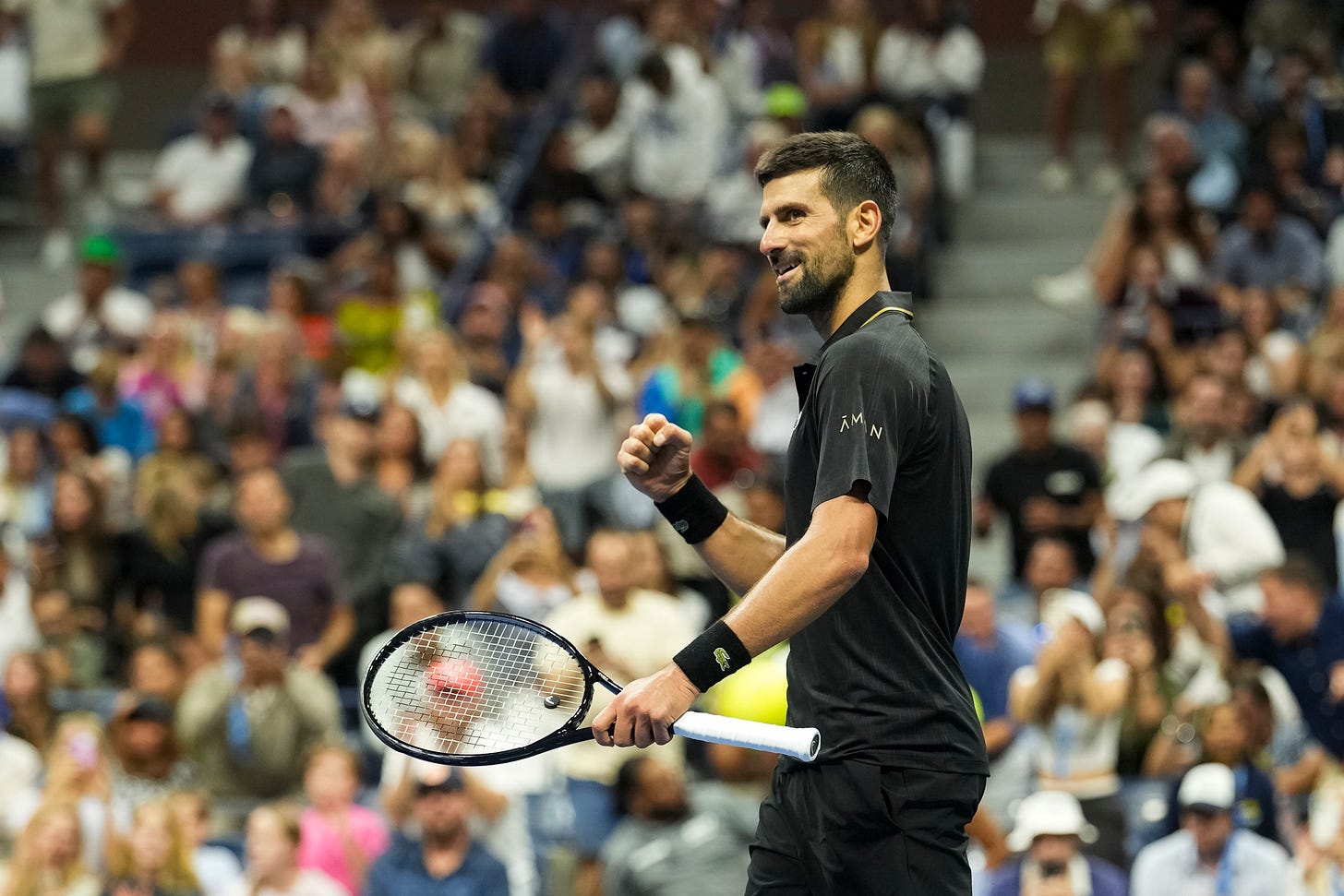
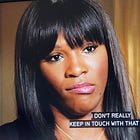

There is definitely a 'lost generation' of wonderful players who never won a slam except by incredible luck. Look at the men's draws pre-covid and the men's draws this week. Look at the scorelines pre-covid and the scattering of really good matches this year. We had dozens of breath-taking matches between the big 3/4/5 with long trails of thrilling tie-breakers where the wonderful players up the other end of the court, the lost generation, who almost always lost on the last point, absolutely made tennis but never won a slam. Look at Gasquet, Monfils, Tsonga, Kyrgios, Thiem (1), Meddy (1), Zverev, Tsitsipas, Delpo, Kokkinakis...fill in the next 20 names of your choice here. Most are retired; many are seriously injured, many are mocked for their failure to meet public expectations. Many are disillusioned with what's happening to tennis now. It is sad that we simply throw away this generation as if they were failures. They were amazing, courageous players. The new guys never played Federer or even Nadal and Djokovic or Stan at his best.
Great interview! The process, all the tiny observations accumulated--this is what ethnographers do. Observe, observe as accurately as possible, transcribe it all and figure out the meaning later. And kudos to Ben too on describing why--although I alway admired Nadal--I never enjoyed watching his matches "It's like he talks over someone in an argument, especially with Federer, kind of shouts over with that topspin." Sinner-Alcaraz have a perfect, well-balanced chemistry. Meddy excerpt hits the nail-on-the-head about why I've always loved him.